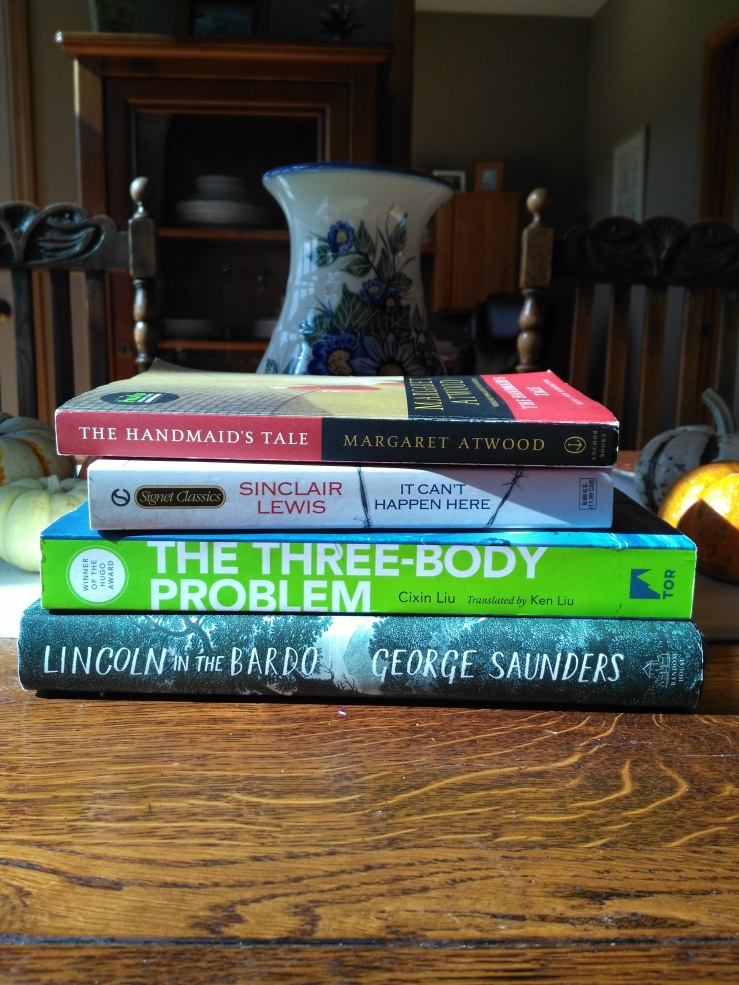
September reads, in chronological order:
Lincoln in the Bardo | George Saunders
This much is true: Abraham Lincoln’s son, Willie, caught a fever and died tragically towards the beginning of the Civil War. Lincoln was so distraught about his favorite son’s death that he visited the mausoleum where his son’s body was laid to rest for several nights after the funeral to hold Willie and weep for him. This much is George Saunders’ imagination: Willie Lincoln gets stuck in the Bardo (yes, the Tibetan one) and a handful of equally torn spirits work to convince him to move on, despite the fact that they themselves haven’t been able to let go either. While the premise of this story is certainly enticing, the real genius is in the form. Saunders splices together bits of historical accounts regarding Lincoln and Willie’s death with his fictional chapters, with dialogue presented almost exactly like the quotes he pulls from his non-fiction resources. It’s unlike any other novel I’ve read, truly, and I’d recommend it to anyone. Especially historical fiction readers, as I think Saunders adds something to the genre that gives it a much-needed creative re-birth.
The Three-Body Problem | Cixin Liu
Liu is China’s most acclaimed science fiction writer, and for good reason: this book is masterfully inventive, exciting, and intellectually stimulating. The story begins during China’s Cultural Revolution, when a Chinese scientist makes contact with an alien civilization. In their message to Earth, the messenger from this civilization warns the scientist not to reply, for if she does, his planet will have no choice but to invade and conquer hers. Thoroughly disillusioned with humanity after experiencing the horrors of the Cult. Rev., she replies. If I go into much more detail, I might spoil the book, so I’ll stop before I say too much more. Aside from some rather cheesy, heavy-handed symmetry at the end of the book (you’ll see what I mean), I think Liu took a trope in science fiction and turned it into something exciting and fresh again, which is no small feat. It’s the first book in a trilogy, and I’m definitely invested enough to keep reading.
It Can’t Happen Here | Sinclair Lewis
Set just before the start of World War II, when Americans could still largely play dumb about Hitler’s atrocities in Europe, this novel follows the life of Doremus Jessup, who, aside from his name, is about as common as common men can get. He’s a middle-of-the-line, business-as-usual, white bread and butter kind of guy. He dislikes that Democrat running for President, Berzelius “Buzz” Windrip, and much prefers Republican Walt Trowbridge, who’s just as milquetoast as Doremus. So when Buzz Windrip’s supporters start forming their own militia and wearing their own uniforms and threatening violence, and Buzz Windrip eggs them on, Doremus Jessup and his friends don’t really worry much about it because “Hey! It can’t happen here.” And by “it,” Lewis means fascism. Well, surprise? It can happen and it does happen. While the book is a little dated, understandably, and there were some disagreeable moments in there for me, it’s got one hell of a message for Americans in the Trump Era (or rather, a message that we should’ve gotten prior to the Trump Era that would’ve presumably made it so we’d never have to utter the words Trump Era ever, ever, ever). At one point, Doremus even realizes that it’s not even Buzz Windrip’s supporters’ fault that things are the way they are; it’s his fault, and the fault of all the other milquetoast white bread moderates who did absolutely nothing while all of this was brewing. Sound familiar?
The Handmaid’s Tale | Margaret Atwood
